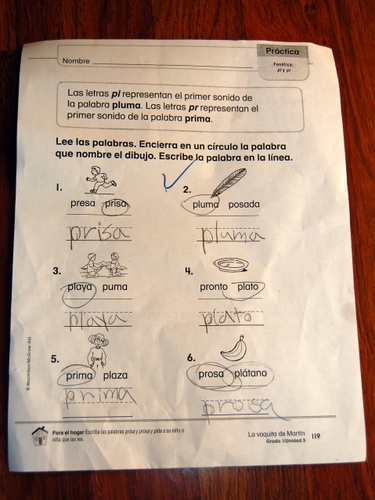a little extra? or too much?
Last fall Violet’s teacher called me. She wanted to know if we would let Violet move into Spanish Language Arts. “Yes!” I nearly shouted into the phone. After all, full immersion is the program we originally wanted for the kids. But the way AISD’s program works, Language Arts is taught in the child’s first language for kindergarten and 1st. This is supposed to give them a solid foundation in reading skills. (I’m not sure, based on current research, that that approach is totally necessary for kids who grow up being read to and are familiar with letters and sounds. It’s mostly geared towards helping kids whose families don’t have that kind of environment. )
At Violet’s school, the monolingual English-speaking population is slightly higher. That means that her English class had a few more kids than what is ideal. So they wanted to move some students who are reading at levels higher than 1st grade over to the Spanish class. Solid foundation in English? Check! Moving on.
Violet is always up for anything new, so my immediate reaction was that she’d have no problem with the change. Her teacher agreed, and expressed concern only about Violet’s… behavior. It turns out (not surprisingly) that when she doesn’t understand something, her mind wanders. And when Violet’s mind wanders, it’s not an inner dialogue. Obviously that’s a problem for the teacher and the other children trying to pay attention. Now I’m even more sympathetic to the ESL kids who struggle to understand their teacher and are labeled problem students when they tune out. Remember trying learn a foreign language? It’s exhausting. No wonder these kids’ brains need breaks.
The wonderful thing about the dual language program is that the teaching is scaffolded to support the students while they’re doing all this tricky work. In Violet’s case, she is allowed to write in English for now. For example, their teacher read them a story about George Washington in Spanish. The kids talked about it in Spanish. Violet asked a couple vocabulary words, and then she wrote a summary of the story in English. “George Washington died of old age. He was a soldier. He did such a good job he became president.” (Knowing how to lead an essay with a good hook is hereditary, by the way.)
The girl reads a lot in English at home, so we’re not worried about that. The only annoying part of this deal is that she has to do English writing homework once a week, in addition to her other homework. (Which would take 5 extra minutes if she would just SIT DOWN AND DO IT). And she misses her English teacher.
Next year all the kids will be taking Spanish AND English language arts. But for now, I’m excited we get a little extra. I learn her vocabulary right along side her each week. Violet? She’s not thrilled about the homework, but she seems to be surprising herself about how much she knows.

That is so wonderful!
!Vaya Violeta!